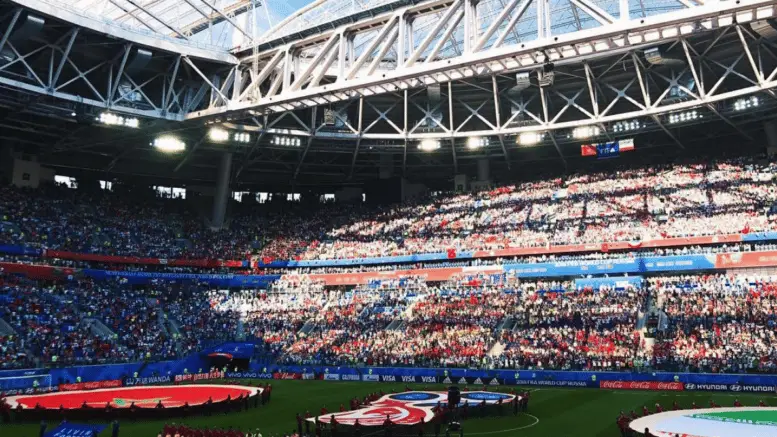Sports has long been a vehicle for cultural diplomacy.
This summer, Russia hosted the 2018 FIFA World Cup. Early June brought a plethora of foreign sports fans entering the Russian Federation. With them, they brought their language, culture, and sports attire.
Sporting events such as the World Cup are prime movers for cultural diplomacy. This was seen first and foremost through the FIFA Fan Ids. Printed on the ids, which every FIFA-going individual was mandated to wear around their necks, was the phrase “Скажи нет расизму” or “Say no to racism.” It was not surprising to see this on an items that would be distributed to thousands of soccer fans – no country wants racism or violence to occur, especially during the adrenaline filled and emotional event that sporting event is. However, this move was especially poignant given Russia’s history and international reputation. Many commentators predicted racist violence would be carried out by Russian hooligans. However, while racism does, of course, exist in Russia, Russia has also been a multiethnic and mulitconfessional state since the time of Ivan the Terrible.
Vladimir Putin has made embracing this diversity in Russia a staple of the new Russian national identity. This is often mentioned in speeches and Putin often meets publically with the heads of Russia’s various “historical confessions.” Thus, “Скажи нет расизму” served a rather elegant purpose. It at once gave a reminder to anyone who might be inclined to racism that they would be expected to behave themselves. It also countered the international stereotype and instead helped project the image of Russia that Russia has promoted for itself.
Russia’s strategic placement of the eleven cities hosting the World Cup games also served a purpose in cultural diplomacy. While major cities like Moscow and St. Petersburg were obvious locations to host the games, places like Saransk and Kaliningrad were more surprising. By hosting the games in smaller or more remote cities pushed international visitors gain a wider view of Russia’s current state – in both the booming capital and smaller provincial towns.
Russia has been focusing its efforts to rebuild its infrastructure, which has slowly been crumbling since at least the Brezhnev era, through these sorts of major sporting and cultural events. FIFA, with multiple locations, gave Russia the opportunity to show visiting foreigners that not only Moscow is prospering, but that its rail and air transportation systems are now renovated and modern in many places and that many of its even smaller cities are being revitalized. This is also consistent with the image that Russia has championed for itself of a country “getting up off its knees.”
By offering a variety of cities across Russia as World Cup hosts, the crowds were encouraged to gain a more multifaceted view of a place that has has otherwise been generally abstract to them. Smaller cities also mean that fans had to be more attentive to language – as finding locals there who speak English is much more difficult than in Moscow or St. Petersburg. While this means much more sign language, it also means that the foreigner is much more likely to be listening to Russian, a language that the Russians have historically taken great pride in and view as an important part of their identity.

President Putin and Saudi Arabian Crown Prince Mohammed bin Salman, with FIFA President Gianni Infantino. Images of their animated conversation went viral on social media.
The World Cup has also offered diplomats the opportunity to engage in discussions while watching a soccer match. President Putin and Saudi Arabian Crown Prince Mohammed bin Salman’s conversation while seated in the box overviewing the opening match sparked discussion about the mixture of politics and sports. But Putin was also shown with the presidents of France, Croatia, Palestine, Gabon, Sudan, and Moldova, the Hungarian prime minister, the Emir of Qatar, and others. This encouraged opportunities for traditional diplomacy and high level talks, but also served a cultural diplomacy purpose as well – broadcasting Russia’s prefered image of itself as an internationally important country favoring multilateralism and generally willing to meet with any country willing to meet with Russia.
The cup was generally counted as a major win for Russia. Russian cities were transformed before the games as waves of infrastructure investment came, but also as a multitude of people converged. Painted wigs, national anthems, and countless flags became the norm for half of the summer in the host cities. With the World Cup, camaraderie among people of different backgrounds was a pleasant phenomenon for this author to witness after seeing so much polarization in international relations and in the domestic politics of my home nation of America.
Russia was also not the only country using the World Cup for cultural diplomacy. Tiny Croatia aired tourism-promoting commercials during the matches. These stared Croatia’s national soccer team members, speaking English and showing Croatia as a country of friendly, beautiful people eating delicious, locally grown foods and enjoying modern culture amid breathtaking landscapes. As Croatia advanced in the tournament, the airtime that comercial enjoyed grew along with Croatia’s obvious national pride.
Sports, culture, and politics have a history of mixing. During the Cold War, hockey was a major sport for the USSR. The “Russian Five,” who played in the Stanley Cup tournament, and scored sweeping wins against American teams was important in the projection of a positive image of the Soviet Union – and its ideology of communism through positive ideals of community and teamwork. Likewise, when Americans scored a rare victory, such as the 1980 Winter Olympics “Miracle on Ice,” sports reporters joyfully yelled that that win was the result of and a tribute to American values: liberty and capitalism. Those interested in this period of sports history should see Red Army, a documentary on the Russian Five.
Sports can be a tool for promoting meetings with diplomats, spreading political ideas, and cultivating a country’s image. Soviet hockey, Cuban baseball, and Armenian chess, among so many other sports that countries are known to excel at, call to mind the positive qualities of these countries that are directly related to their sports teams’ proficiencies.
Sports are a natural diplomatic tool since sportsmanship and mutual respect are key values in the culture of athletics. Sports promote competition, but also goodwill and a source of common dialogue. In a world of increasing polarization, perhaps more of diplomacy and politics should be taken over by sports and culture.




